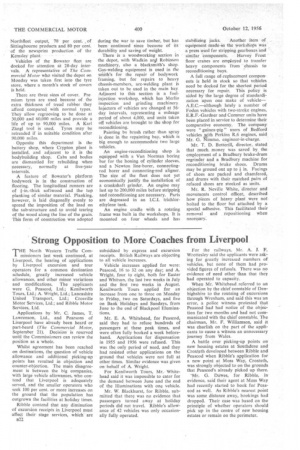'Strong Opposition to More Coaches from Liverpool
Page 56

If you've noticed an error in this article please click here to report it so we can fix it.
THE North Western Traffic Commissioners last week continued, at Liverpool, the hearing of applications by Liverpool excursion and tour operators for a common destination schedule, greatly increased vehicle allowances, and other minor variations and modifications. The applicants were G. Peascod, Ltd.; Kenilworth Tours, Ltd.; A. Wright, Ltd.; Lancashire United Transport, Ltd.; Crosville Motor Services, Ltd.; and Ribble Motor Services, Ltd.
Applications by Mr. C. James, T. Lawrenson, Ltd., and Pearsons of Liverpool have already been heard or part-heard (The Commercial Motor, September 21). Decision is reserved until the Commissioners can review the position as a 'whole.
Whilst agreement has been reached on destinations, the question of vehicle allowance and additional picking-up points has resulted in objection and counter-objection. The main disagreement is between the big companies, with large vehicle allowances, who contend that Liverpool is adequately served, and the smaller operators who seek 100 per cent. or more increases on the ground that the population has outgrown the facilities at holiday times.
Ribble contend that any diminution of excursion receipts in Liverpool must affect their stage services, which are B22 subsidized by express and excursion receipts. British Railways are objecting to all vehicle increases.
Vehicle increases applied for were: Peascod, 16 to 32 on any day; and A. Wright, four to eight, both for Easter and Whitsun, the last two weeks in July and the first two weeks in August. Kenilworth Tours applied for an increase from one to three on Monday to Friday, two on Saturdays, and five on Bank Holidays and Sundays, from June to the end of Blackpool Illuminations.
Mr. E. A. Whitehead, for Peascod, said they had to refuse hundreds of passengers at these peak times, and were often fully booked a week beforehand. Applications for dispensation in 1955 and 1956 were refused. This was the only period of need, and they had resisted other applications on the ground that vehicles were not full at other times. Similar evidence was given on behalf of A. Wright.
For Kenilworth Tours, Mr.Whitehead said it was impossible to cater for the demand between June and the end of the Illuminations with one vehicle.
Mr. W. Blackhurst, for Ribble, submitted that therc was no evidence that passengers turned away at holiday periods did not travel. Ribble's allowance of 42 vehicles was only occasionally fully operated.
For the railways, Mr. A. J. F. Wrottesley said the applicants were asking for greatly increased numbers of vehicles, but none of them had provided figures of refusals. There was no evidence of need other than that they had operated to capacity.
When Mr. Whitehead referred to an objection by the chief constable of Denbighshire to the routeing of excursions through Wrexham, and said this was-an error, a police witness protested that Peascod had had notice of the objection for two months and had not communicated with the chief constable. The chairman, Mr. F. Williamson, said it was churlish on the part of the applicants to cause a witness an unnecessary journey from Wales.
A battle over picking-up points on new housing estates at Southdene and Croxteth developed between Ribble and Peascod when Ribble's application for a new point at Moss Way, Croxteth, was strongly objected to on the grounds that Peascod's already picked up there.
'Mr. G. Dawes, for Ribble, in evidence, said their agent at Moss Way had recently started to book for Peascod as well. As Ribble's nearest point was some distance away, bookings had dropped. Their case was based on the principle of whether operators should pick up in the centre of new housing estates or remain on the perimeter.




















































































































